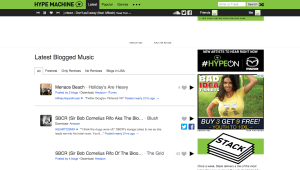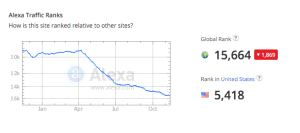HypeMachine: Using Data and Aggregation to Surface The Next #1 Song

Music blog aggregator HypeMachine turned a scraping hack into a giant platform for music discovery and promotion. Oh, and they built out a streaming music service as well, built on top of content that they don't even host.
With more music being created and distributed than ever before, staying “up-to-date” and “exposed” to good music can feel extremely overwhelming. Rather than the best stuff rising to the top, consumers are bombarded by the content that record labels want (and pay for) them to be exposed to. The same songs get played over and over on radio, TV, and on most standard music distribution platform charts. It can be quite exhausting and discouraging for people with more refined tastes that don’t want to spend the time finding good music on their own. As consumption moves to streaming, more and more music companies are working to use data to make this discovery and consumption cycle easier and more enjoyable. Spotify now creates custom playlists weekly for all of its users based on recommendations related to songs the user has streamed in the past.
.
Another service leveraging the data-model to add value in the music ecosystem is blog-aggregator / consumption platform HypeMachine. What is their value proposition? As their website describes: “Every day, thousands of people around the world write about music they love — and it all ends up here.” Essentially, HypeMachine has a network of blogs that it crawls regularly for new content posts, and then creates charts based on the songs that are being written about by the most individual/influential blogs. This sort of metadata matching can be quite difficult, especially if the format for each content post is different. Luckily, the rise of Soundcloud as a hosting platform has unified the format and reduced the matching issue.

In building its platform, HypeMachine was faced with a two-sided platform problem: it needed to have enough blogs on its “blog reel” to create meaningful charts, then it needs to convince enough users that these charts are a relevant source of quality content. To bake in value to the HypeMachine platform itself, the company includes number of “likes” on hypem.com in addition to the number of times a song is posted about, tweeted about, etc. Let’s not forget, however, about a third but vitally important member of this ecosystem: the artists themselves. When HypeMachine first emerged, the users were the first people to pay attention. With enough users, blogs started seeing meaningful referral traffic, so they started taking notice. Then, once the platform was legitimized by these two players, artists (and management) gave it credence by starting to use the HypeMachine charts as a source of pride and promotion for releases. In addition to aspiring to top the Billboard or iTunes charts, artists now wanted to reach the top of the HypeMachine charts as well.
.
The company captures value in several different ways, but both rely on monetizing a large user base. On its website, the company runs a fair number of advertisements, similarly to many online blogs. The company also has “sponsored tracks” where artists and labels can pay for additional exposure. Additionally, rather than giving away its mobile streaming app for free, HypeMachine chooses to charge $3.99 upfront. Finally, HypeMachine has referral links to iTunes, Amazon, etc. where people can choose to purchase a track they found on HypeMachine, and where the company gets a cut. All of these monetization methods work best when the company has a sticky product with a lot of eyeballs. While the site has struggled in the last several months (likely due to marketing pushes from other streaming platforms), it’s in the top 5,500 sites in the United States and thus generating a fair number of visits, which translates to revenue for the company.

However, they are certainly constrained by their operating model in this regard. Since at its core HypeMachine is a content aggregator, they will have a difficult time monetizing the content itself. This is why they’ve charged for everything but the content … because at the end of the day the artists are choosing to post this (for free) to Soundcloud, and then blogs are reposting this content (for free) on their music blog while they monetize traffic, and finally HypeMachine aggregates that content (for free) and once again monetizes the eyeballs. I suspect challenges for HypeMachine lie ahead as companies with massive user bases get better and better about using the data that they have on customer listening. For example, Spotify refers to itself as a data company just as much as a tech company or a music company … and it is seeking to take personalization and suggested music listening to a completely new level as its data treasure trove grows. After all, the content sweet spot for HypeMachine is content that is free and lingering about the open Internet, remixes and other instances of content production that might not be allowed to be monetized by artists on official platforms. If it were, the official platforms would win the content because they could compensate the artists more for it. A partnership with concert service Songkick signals a possible direction for HypeMachine, where they can effectively convert casual online listeners to active concertgoers for a small fee. After all, in the end the only thing that matters is engagement.
https://en.wikipedia.org/wiki/Hype_Machine
http://99u.com/articles/6376/anthony-volodkin-why-steep-learning-curves-are-worth-it
http://money.cnn.com/magazines/business2/business2_archive/2006/10/01/8387122/index.htm



Great post Jeff. I agree that HypeMachine has not been performing that well lately compared to platforms such as Spotify, in your post you attribute this to marketing pushes from other streaming platforms; however, might the content on HypeMachine be too niche? Perhaps this might wind up being the site for the music fanatic, the hyper-user, rather than just the casual everyday listener. Even from just a UI perspective, I find the app difficult to navigate. I can find what’s new, what’s popular, different genres and a blog directory, but I feel like I can’t find what I like. For example, if I look at genres, I don’t know what Lo-Fi, Ambient, Dub-Step, Beats or Dreampop are to name a few. How do I find out what music is music I’d like? I think from this point of view the site could really benefit for more Spotify-like discovery mechanisms.
Great post! I think HypeMachine serves an important purpose by empowering music bloggers and helping high-quality writers get more exposure. I wonder if the same concept of aggregating data and creating objective rankings to help people easily discover the highest quality content can be applied to other industries as well. In a world in which the amount of data exponentially increases, solutions like that of HypeMachine are going to be more and more important.
Great post. How do you think this plays out, if successful, over the long run. Where can record labels add value? Will the music bloggers and other content creators keep their independence or be converted to the “dark side” once their influence becomes apparent.
I’m a big fan of Hype Machine – have been using it for years to discover new music. I think it’s a great example of crowdsourced to surface things that otherwise might not be visible – in this case up and coming music. It’s sad to see that Hype’s traffic has fallen lately though I can understand why since Spotify offers more of a one stop shop for music listening and discovery. The thing that gives me hope is that Hype Machine seems like a very lean operation and shouldn’t have major operating expenses, so hopefully they’ll continue to run and keep on serving up new hits.
Really interesting post! Thanks for sharing. This industry is fascinating to me in large part because so much is changing around how music is created, consumed, and shared. You raise some very good points around the benefits of a site like this as well as potential hurdles it faces. Really interesting about how they scrap data from all the various sources.
Do you think there are stakeholders in this space that Hype Machine creates disproportionate value for? I wonder if they should be charging more (or less) for certain aspects of its offering depending on where it’s true value lies.
Great post!
Great post! The one thing I find super interesting about Hype Machine is its huge value add to bloggers (not just consumers). For any blog chosen to be one of the 750 (give or take), Hype Machine is a huge source of new traffic.
The other thing: A lot of the “popular chart” is a bit self-fulfilling, I think. I’ve noticed a trend in which bloggers check the popular chart (for new music), see what’s popular, like what they hear, and then post it again (only further cementing chart standings).